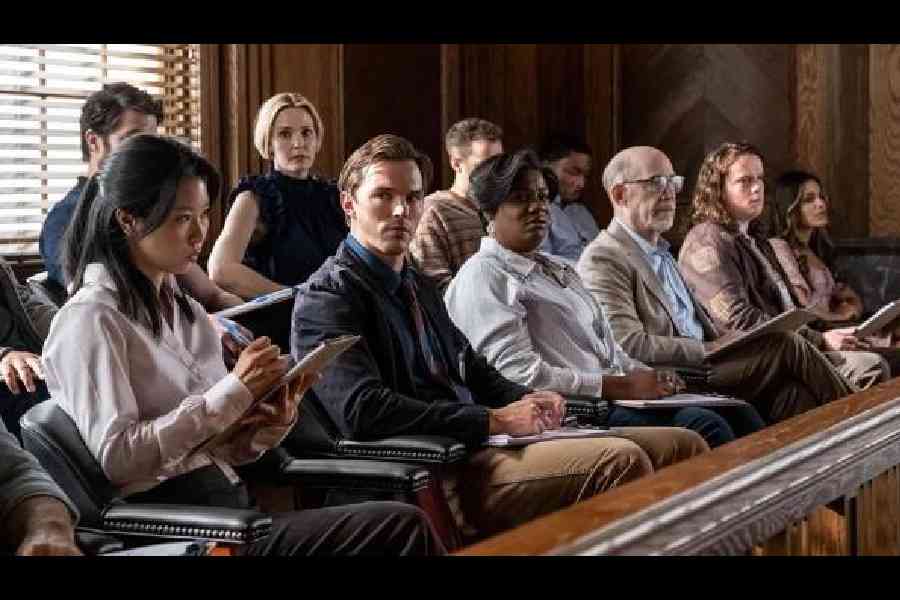Sometimes truth isn’t justice, and justice isn’t truth’. Delivered with both pain and profundity in the penultimate moments of Juror#2, this incandescent line not only sums up the film, but the justice system as a whole, anywhere in the world.
Exposing the fault lines in our rules of crime and punishment, but in the kind of quiet yet forceful manner which has been a signature of his brand of filmmaking ever since Clint Eastwood first put on the director’s hat a staggering 53 years ago, Juror#2 is the type of film that makes your mind go back to it time and again even days and weeks after watching it.
On the surface, Juror#2, Eastwood’s 40th film as director, is a tightly packed courtroom drama that uses both economy and efficacy to engage the viewer. Dig deeper and you will find Eastwood the master at work, slowly peeling away the layers to not only explore human follies and frailties but also expose the loopholes that plague the system.
Juror#2 places Nicholas Hoult at its front and centre. The British actor, who has already accumulated a neat body of work, is a good choice for the lead role of Justin Kemp, a man who is compelled to stay stoic even as a storm surges within him.
Justin, a recovering alcoholic with a baby on the way, is picked as a juror in what appears to be an open-and-shut homicide case. A woman is found battered to death below a bridge moments after a nasty and very public showdown with her boyfriend. The man, James Sythe (the Night Agent’s Gabriel Basso), is the only suspect because everything points at him — and also because the cops have been too lazy to look anywhere else. Everything is stacked against Sythe, including the pre-emptive notions of the majority of jurors even before the first arguments of the case have been made. There are also other factors at play here — public prosecutor Faith Killebrew (Toni Collette) is running a campaign for the office of district attorney, a large part of that result hinging on how seamlessly and speedily she can dispose off this case.
What opens as a regular courtroom drama is, however, anything but. Even as he prepares to do his jury duties to the best of his ability, Justin, piecing together the case in the initial stages, chances upon events and evidence horrific enough to tie him to the murder more inextricably than in the capacity of a juror. Battling an unending moral dilemma, driven by guilt and oscillating between two extremely tough choices, Justin finds his whole life slowly turning in on him.
Eastwood expertly sets up Jonathan Abrams’s script, which is inventively put together as a hat-tip to Sidney Lumet’s 12 Angry Men and brings in a smidgen of Otto Preminger’s Anatomy of a Murder, all the while imbued with the typical traits of Edgar Allan Poe’s work, particularly his classic short story The Tell-Tale Heart. Juror #2 takes Justin — and the viewer — to the edge of a tricky abyss, offering a tense yet sharp discourse on tottering ethics, the price of truth and the fragility of justice.
Eastwood scores in giving Abrams’s slightly gimmicky script a subdued but engaging treatment. The probing drama — talky and yet telling in its silent moments — sifts through moral ambiguities without enforcing any didactic conclusions.
The most distinctive aspect of Juror #2 is that it has no heroes or villains. Every individual involved in the case, in measures small and big, is a victim of circumstances. Justin and James may be on opposite ends of the courtroom, but they are essentially the same people — one rescued and allowed a second chance at life; another condemned forever to a life behind bars because of one bad choice. Even Justin and Faith, again positioned on antithetical sides of the case, inadvertently find themselves on common ground, each racked by unfathomable moral guilt the deeper they hurl themselves into the case.
That the acting is top rate — Collette can turn around even a bad script and here she has a pretty good one — works in elevating the film, with each player, from J.K. Simmons and Kiefer Sutherland in brief but impactful roles to Chris Messina as the defendant’s lawyer to the ragtag members of the jury, lending something special to their parts.
At 94, Eastwood may have started his acting career being boxed within a certain prototype, but as a filmmaker, he has never let any one genre define him. Juror #2 is a fine example of that. In October, Juror #2, supposed to be Eastwood’s last film as director, was released by Warner Bros in select theatres in the US with the box-office numbers not being revealed to the public. If the intention was to bid farewell to the Man Who Once Had No Name with respect, it has been a huge disservice to Juror #2, a film that deserves to be seen as a community experience, the dark and closed atmosphere of a theatre mirroring the carefully built claustrophobia within the film.
It hasn’t been made clear yet whether Eastwood would ever be tempted to return to the director’s chair. But if 2024 has taught us anything, it is that the masters — Francis Ford Coppola with Megalopolis, Ridley Scott with Gladiator II and, of course, Eastwood — are the ones keeping good ol’ cinema, as we know it, alive. They cannot leave.










